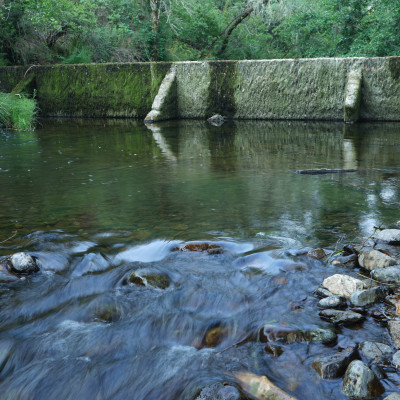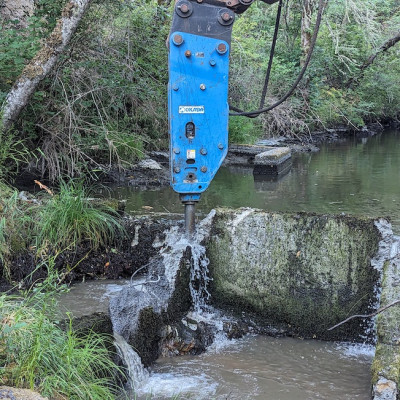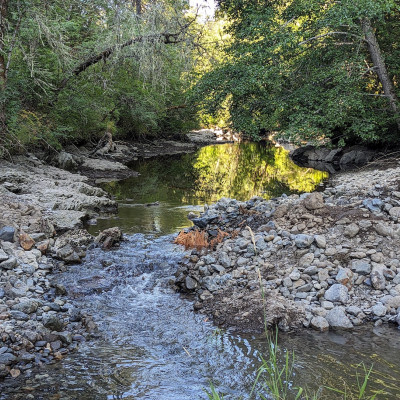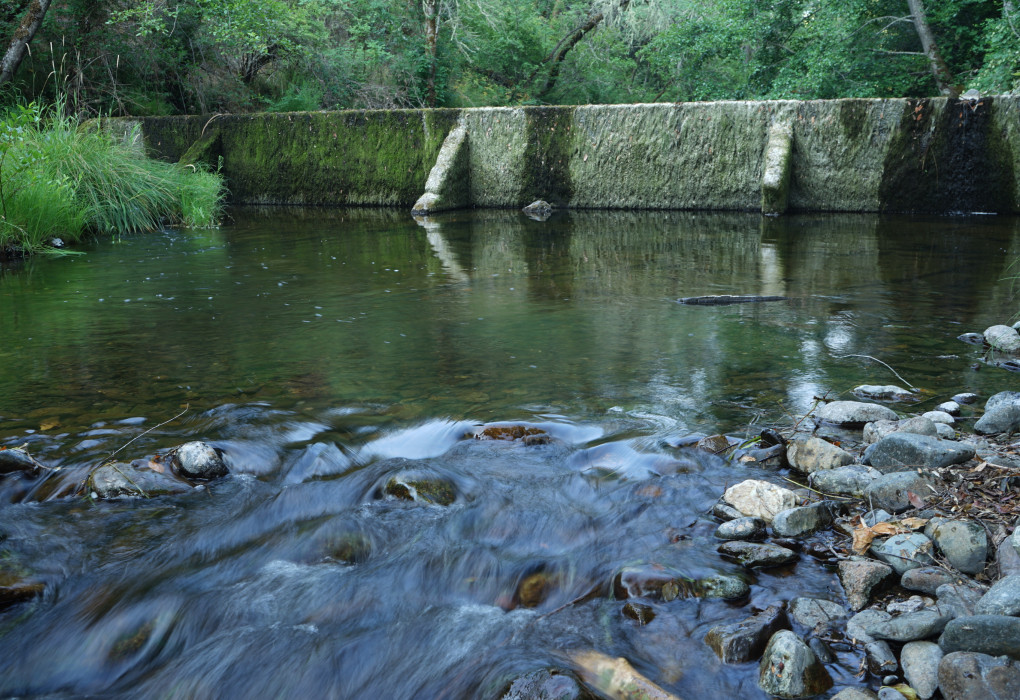Fifth Dam Removal Completed in Three Years in Rogue River’s Applegate Subbasin
Press Release by WaterWatch of Oregon, August 1, 2023
Collaborative effort benefits salmon and steelhead, increases resiliency to climate change
Wilderville, OR – Last week, work crews finished the demolition of an abandoned concrete former mill dam as part of a larger collaborative effort to restore access to habitat for native salmon and steelhead in Slate Creek, a key spawning tributary of the Rogue Basin’s Applegate River. Lovelace Dam, listed in Group 2 on the 2019 Statewide Fish Passage Barrier Priority List by the Oregon Department of Fish and Wildlife (ODFW), becomes the fourth fish-impeding dam to be removed from Slate Creek in the last three years, and the fifth dam overall removed in the wider Applegate subbasin over the same period. The Lovelace project significantly improved access to approximately 26 miles of spawning and rearing habitat for salmon and steelhead while also reducing flooding risk on the landowner’s property.
Notably, the Lovelace Dam removal is the first in the nation across the finish line among restoration projects receiving funding from NOAA Fisheries under the federal Bipartisan Infrastructure Law. The project also represents one of the many restoration projects in Oregon accelerated thanks to an ODFW grant awarded out of the $8 million in Drought Funds appropriated to fish passage improvement projects during the 2022 legislative session. Slate Creek is now entirely free-flowing at the former dam site for the first time in at least a century. Prior to drawdown of the Lovelace Dam reservoir and the commencement of structural demolition, the Oregon Department of Fish and Wildlife (ODFW) led fish salvage operations at the site.
“This is great news for salmon and steelhead, and the many people who love the Rogue River,” said Jim McCarthy, Southern Oregon Program Director for WaterWatch. “The accelerated pace of river restoration in the Rogue is a great credit to the many partners who came together to get the work done, and demonstrates the need to maintain the federal and state programs that make these projects possible.”
State and federal agencies have identified Slate Creek, and improving access to quality fish habitat in its upper reaches, as important to the recovery of Southern Oregon/Northern California Coast Coho salmon, listed as threatened under the Endangered Species Act. In addition to Coho salmon, Slate Creek provides spawning and rearing habitat for fall Chinook salmon, summer and winter steelhead, cutthroat trout, Klamath smallscale suckers, and Pacific lamprey. The project addressed the highest priority fish barrier in the Rogue since the Gold Hill Irrigation District Diversion Dam Improvement Project in 2016.
“This project is a strong collaboration between a private landowner, agencies, and non-profit organizations working towards the goal of improving fish passage,” said John Speece, Project Manager for Rogue River Watershed Council. “This project demonstrates the kind of watershed health and landowner benefits that we hope to create more of in the Rogue Basin, and represents a shift in restoration focus to smaller streams now that many of the larger fish passage barriers on the mainstem Rogue River have been addressed.”
“There are just a handful of streams in the Rogue Basin that provide quality spawning and rearing opportunities for Coho salmon and Slate Creek is in that handful,” said Brian Barr, Executive Director for the Rogue River Watershed Council. “Removing this obsolete dam makes it much easier for these protected Coho to reach 26 miles of prime spawning and nursery habitat, and increases our watershed’s overall resiliency against the harms of climate change.”
WaterWatch previously secured the removal agreement for the dam from the private landowner, which ensured removal at no cost to them. Since then, the group partnered with the Rogue Basin Partnership and the Rogue River Watershed Council to secure funding for the project. Rogue Basin Partnership secured $45,000 in grant funding from NOAA Fisheries Restoration Center. Additional funding partners include ODFW, Oregon Watershed Enhancement Board (OWEB), U.S. Fish & Wildlife Service Partners for Fish & Wildlife Program, Resources Legacy Fund, and The Flyfishers Foundation. The OWEB funding included $159,180 of Bipartisan Infrastructure Law (BIL) funding via OWEB’s annual Pacific Coastal Salmon Recovery Funds grant from NOAA. Rogue River Watershed Council oversaw the contracting for removing the dams, with engineering firm River Design Group providing survey, design, and construction oversight services. River Design Group, U.S. Fish & Wildlife Service, and Rogue River Watershed Council provided permitting services for this project. Central Point-based stream restoration contractors M&M Services performed the dam demolition and stream restoration.



